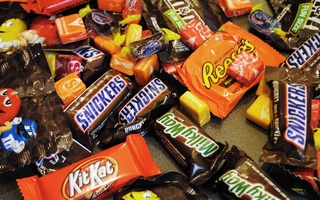While the River Houses typically gain notoriety for their cockroach infestations, Pforzheimer House drew crowds Tuesday looking to familiarize themselves with the Quad’s own indigenous insects: honeybees.
A collaboration between several Harvard and Cambridge-based organizations, Tuesday’s Bee Day at Harvard was an all-day celebration of honeybees and their sweet byproduct. The event included local honey samples, tours of hives, and a joint screening and presentation on ongoing bee research.
Bee Day marked the first official event of a busy fall season for the Harvard Museums of Science and Culture. With Bee Day, HMSC launched an agenda of book talks, speaker series, and interactive museum tours with Harvard professors as a part of its mission to make Harvard’s resources—both material and intellectual—more accessible to the Cambridge community at large.
“The museums are one of Cambridge’s biggest tourist attractions,” said Blue Magruder, director of communications for HMSC. “The museums and these events are a wonderful portal into what’s going on at the University.”
The attempt to open Harvard to the public manifested in several tours of Harvard’s hives, which are offered by the Harvard Undergraduate Beekeepers Club. The group facilitated the visits and lent an enthusiastic undergraduate voice to the day’s celebration.
“There are tons of reasons to love bees,” said Sarah E. Callan ‘14, a member of the organization. “Seeing another organism be social like humans is beautiful, but it’s just one of the remarkable things about bees.”
In addition to attracting the interest of undergraduates, bees have also caught the eye of some of Harvard’s biologists and health researchers who have recently directed their focus to the buzzing insect.
The evening program included a screening of “More Than Honey,” a documentary on the ecological dangers of declining bee populations. The screening was followed by a presentation from Chensheng A. Lu, professor at Harvard School of Public Health.
Given the central importance of bees to many elements of human society—ranging from their pollination of many main food items to production of wax and honey to their role in the ecosystem—we must “raise awareness and push for the protection of honeybees,” Lu said. “What if one day we don’t have enough bees to pollinate our food?”
—Staff writer Jessica A. Barzilay can be reached at jessica.barzilay@thecrimson.com. Follow her on Twitter @JessicaBarzilay.
Recommended Articles
-
Venn Diagram: Seniors v. SeniorsCollege seniors and senior citizens have more in common than you might think.
-
Talk Commemorates Entomology BookTwo entomologists discussed the nuances of communication and temperature regulation in honey bees at a presentation hosted this past Tuesday by the Harvard Museum of Natural History.
-
Sweet Honey a Rare TreatAll-female a cappella group Sweet Honey in the Rock will be performing at Harvard this coming Thursday and Friday as part of the Women's Choral Festival.
-
It’s a Bee-sy Time of Year AgainAs we dip the apple in honey and wish each other a sweet and productive new year, we would all do well to remember that the golden goodness with which we coat our fruit is in fact the culmination of the efforts of millions of honeybees that are foraging away to produce just a few drops of nature’s sweet elixir.
-
 Harvard Today: Sept. 10, 2013
Harvard Today: Sept. 10, 2013 -
 Where to Trick or Treat in the Square
Where to Trick or Treat in the Square













